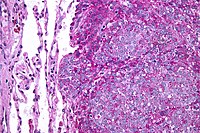
Photo from wikipedia
The sinonasal cavities harbor a wide variety of rare cancer types. Histopathological classification can be challenging, especially for poorly differentiated tumors. Despite advances in surgery and radio-chemotherapy, the 5-year survival… Click to show full abstract
The sinonasal cavities harbor a wide variety of rare cancer types. Histopathological classification can be challenging, especially for poorly differentiated tumors. Despite advances in surgery and radio-chemotherapy, the 5-year survival rate is still very low. Thus, there is an unmet clinical need for new therapeutic options. We retrospectively evaluated poorly differentiated tumors of 9 different histological subtypes from 69 patients who had received conventional treatments for the presence of CD8+ tumor-infiltrating lymphocytes (TILs), as well as the expression of PD-L1 and microsatellite instability (MSI) markers MLH1, MSH2, MSH6 and PMS2, as biomarkers for immunotherapy. CD8+ TILs were present in 23/69 (33%) cases, PD-L1 expression was observed in 23/69 (33%), and markers for MSI positivity in 5/69 (7%) cases. CD8+ TILs correlated with PD-L1 positivity, while both were mutually exclusive with MSI markers. None of the biomarkers were associated with clinical features as age, gender or tumor stage. Cases with CD8+ TILs and PD-L1 positivity showed a tendency toward worse disease-specific survival. Immune checkpoint inhibitors are emerging as new options for treatment of many tumor types. Our results indicate that also a substantial subset of patients with poorly differentiated sinonasal tumors may be a candidate to be treated with this promising new therapy.
Journal Title: Biomedicines
Year Published: 2022
Link to full text (if available)
Share on Social Media: Sign Up to like & get
recommendations!